|
|
|
Sort Order |
|
|
|
Items / Page
|
|
|
|
|
|
|
| Srl | Item |
| 1 |
ID:
192018
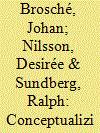

|
|
|
|
|
| Summary/Abstract |
Civil wars that appear to observers to be the most complex—even using a colloquial understanding of the concept—are also those that seem to register the most intense fighting, the most prolonged spells of war, and the most resistance to durable conflict resolution. But what does it really mean for a civil war to be complex? We currently lack a concept of “civil war complexity” that can help us better understand the most important variations in civil wars across time and space. To address this gap we develop a conceptualization of “civil war complexity” consisting of three dimensions—“actor complexity,” “behavior complexity,” and “issue complexity”—and demonstrate how they manifest empirically. We also highlight this conceptualization’s utility—and the danger of overlooking it—through the case of Darfur. This conceptualization paves the way for a new research agenda that explores how civil wars differ in terms of their complexity, the causes and consequences of civil war complexity, and how to refine conflict resolution techniques and strategies.
|
|
|
|
|
|
|
|
|
|
|
|
|
|
|
|
| 2 |
ID:
122903
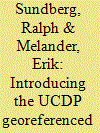

|
|
|
|
|
| Publication |
2013.
|
| Summary/Abstract |
This article presents the UCDP Georeferenced Event Dataset (UCDP GED). The UCDP GED is an event dataset that disaggregates three types of organized violence (state-based conflict, non-state conflict, and one-sided violence) both spatially and temporally. Each event - defined as an instance of organized violence with at least one fatality - comes with date, geographical location, and identifiers that allow the dataset to be linked to and merged with other UCDP datasets. The first version of the dataset covers events of fatal violence on the African continent between 1989 and 2010. This article, firstly, introduces the rationale for the new dataset, and explains the basic coding procedures as well as the quality controls. Secondly, we discuss some of the data's potential weaknesses in representing the universe of organized violence, as well as some potential biases induced by the operationalizations. Thirdly, we provide an example of how the data can be used, by illustrating the association between cities and organized violence, taking population density into account. The UCDP GED is a useful resource for conflict analyses below the state and country-year levels, and can provide us with new insights into the geographical determinants and temporal sequencing of warfare and violence.
|
|
|
|
|
|
|
|
|
|
|
|
|
|
|
|
| 3 |
ID:
112781
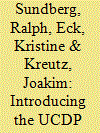

|
|
|
|
|
| Publication |
2012.
|
| Summary/Abstract |
This article extends the Uppsala Conflict Data Program (UCDP) by presenting new global data on non-state conflict, or armed conflict between two groups, neither of which is the state. The dataset includes conflicts between rebel groups and other organized militias, and thus serves as a complement to existing datasets on armed conflict which have either ignored this kind of violence or aggregated it into civil war. The dataset also includes cases of fighting between supporters of different political parties as well as cases of communal conflict, that is, conflict between two social groups, usually identified along ethnic or religious lines. This thus extends UCDP's conflict data collection to facilitate the study of topics like rebel fractionalization, paramilitary involvement in conflict violence, and communal or ethnic conflict. In the article, we present a background to the data collection and provide descriptive statistics for the period 1989-2008 and then illustrate how the data can be used with the case of Somalia. These data move beyond state-centric conceptions of collective violence to facilitate research into the causes and consequences of group violence which occurs without state participation.
|
|
|
|
|
|
|
|
|
|
|
|
|
|
|
|
| 4 |
ID:
082017
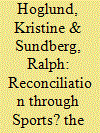

|
|
|
|
|
| Publication |
2008.
|
| Summary/Abstract |
Can sports-and if so how-serve as a vehicle for reconciliation and increased social cohesion in countries wrecked by civil conflict? This article analyses the case of South Africa and its experiences in the sports sector since the fall of apartheid, in an effort to explore the processes necessary to understand the potential sports may hold for peace building. By identifying initiatives in South Africa employed at the national, community and individual level of analysis, the article outlines the possible effects of sports on reconciliation in divided states. Through linking experiences from state policies, ngo activities and donor projects with social identity and reconciliation theory, the article outlines the possible positive and negative aspects of sports. Finally, important avenues for further research to uncover how to turn sports into effective political tools for post-conflict peace building are suggested
|
|
|
|
|
|
|
|
|
|
|
|
|
|
|
|
| 5 |
ID:
085358
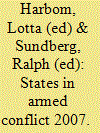

|
|
|
|
|
| Publication |
Sweden, Uppasala University, 2008.
|
| Description |
240p.
|
| Series |
Research Report; no.83
|
| Standard Number |
9789150620290
|
|
|
|
|
|
|
|
|
|
|
|
Copies: C:1/I:0,R:0,Q:0
Circulation
| Accession# | Call# | Current Location | Status | Policy | Location |
| 053990 | 322.5/HAR 053990 | Main | On Shelf | General | |
|
|
|
|
| 6 |
ID:
092113


|
|
|
|
|
| Publication |
Sweden, Department of peace and conflict research, 2008.
|
| Description |
247p.
|
| Standard Number |
9789150621105
|
|
|
|
|
|
|
|
|
|
|
|
Copies: C:1/I:0,R:0,Q:0
Circulation
| Accession# | Call# | Current Location | Status | Policy | Location |
| 054589 | 322.5/HAR 054589 | Main | On Shelf | General | |
|
|
|
|
| 7 |
ID:
172162
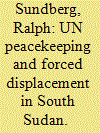

|
|
|
|
|
| Summary/Abstract |
Does UN peacekeeping reduce the number of people forcibly displaced by violence? While previous research has found that the presence and size of peacekeeping deployments can reduce violence, little is known about how peacekeepers affect other aspects of civilian protection. Using original data on sub-national events of forced displacement and the location and size of UN troop deployments this study systematically evaluates the criticized efforts of UNMISS in South Sudan, while simultaneously testing hypotheses on peacekeepers and forced displacement. It is hypothesized that increasing numbers of troops affect the flight equation among civilians through the promise of and actual deterrence of violence. These deterrence-based hypotheses are also discussed in relation to the South Sudan context, creating scope conditions for their possible application in this case. The statistical analysis provides, however, no robust evidence for peacekeepers reducing the occurrence or levels of forced displacement, and only weak evidence of displaced congregating in larger numbers around peacekeeping locations. The paper ends by arguing that the theoretical argument provided may still be valid, but that an effect was not feasible to identify in South Sudan where the peacekeeping mission – despite its comparatively large numbers – lacks credible deterrent capacity.
|
|
|
|
|
|
|
|
|
|
|
|
|
|
|
|
|
|
|
|
|